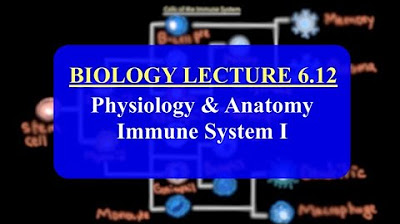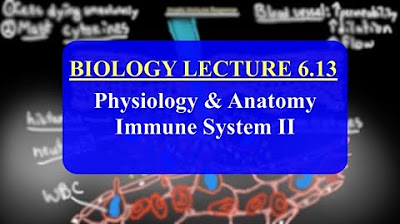SISTEMA IMUNOLÓGICO - Imunidade Inata e Adaptativa | Biologia com Samuel Cunha
Summary
TLDRThis video explains the complexities of the immune system, focusing on its innate and adaptive components. The speaker describes how immune cells, particularly T-helper cells and cytotoxic T cells, work to identify and eliminate pathogens. The concept of immunological memory is highlighted, explaining how the body remembers past infections and responds more quickly to future encounters with the same pathogen. The video also addresses the importance of vaccines in providing long-term immunity and discusses the difference between vaccines and serums. The speaker encourages further exploration into immunology and the body's defense mechanisms.
Takeaways
- 😀 T helper (CD4) cells recognize antigens and present them to immune cells like macrophages for destruction.
- 😀 Cytotoxic T (CD8) cells directly destroy infected cells, preventing viruses from spreading in the body.
- 😀 The immune system has memory cells that store information about pathogens, enabling quicker responses to future infections.
- 😀 Vaccines stimulate the immune system to create memory cells, offering long-term protection against specific pathogens.
- 😀 The flu virus mutates frequently, which is why flu vaccines need to be updated annually.
- 😀 The primary immune response is slower and less efficient because the immune system is encountering the pathogen for the first time.
- 😀 The secondary immune response is much faster and more efficient due to memory cells recognizing the pathogen from previous exposure.
- 😀 Sero-therapy provides immediate immunity by injecting antibodies directly into the bloodstream, useful for infections like snake bites or tetanus.
- 😀 Memory immunity helps prevent recurrent infections, such as only getting chickenpox once because the immune system 'remembers' it.
- 😀 The immune system is adaptive, meaning it learns and improves its ability to fight off pathogens with each exposure.
- 😀 The lecturer encourages students to suggest future lesson topics, emphasizing their passion for teaching and engaging with learners.
Q & A
What is the main focus of the video script?
-The video script primarily discusses the innate and adaptive immune systems, explaining their functions, mechanisms, and how they protect the body from pathogens.
What does 'innate immunity' mean?
-Innate immunity refers to the body's defense system that you are born with. It is non-specific and does not change over time, providing an initial line of defense against pathogens.
How does the body differentiate between its own cells and pathogens?
-The body uses various immune cells, like leukocytes, which can distinguish between 'self' cells and foreign invaders such as bacteria, viruses, and fungi, recognizing them as harmful and targeting them for destruction.
What role does the skin play in innate immunity?
-The skin serves as a physical barrier that prevents microorganisms from entering the body. Its tightly packed layers of cells, along with dead cells on the surface, make it difficult for pathogens to penetrate.
What are interferons and how do they help protect the body?
-Interferons are glycoproteins released by cells infected with a virus. They alert neighboring cells to the viral threat, prompting them to prepare defense mechanisms to inhibit viral replication.
What is the function of the complement system in immunity?
-The complement system consists of proteins that work together to trigger a cascade of reactions leading to inflammation, enhancing the immune response, and marking pathogens for destruction by other immune cells.
What is the role of fever in the immune response?
-Fever is a symptom of immune response, where the body raises its temperature to make it less favorable for pathogens, slowing their replication. It is an indirect way to fight infections.
How does the adaptive immune system differ from the innate immune system?
-The adaptive immune system is specific and develops over time. It produces antibodies and memory cells tailored to particular pathogens. In contrast, the innate immune system is non-specific and responds immediately to all threats.
What is the role of B lymphocytes (B cells) in the adaptive immune system?
-B lymphocytes are responsible for producing antibodies. These antibodies bind to antigens (foreign substances) on pathogens, marking them for destruction by other immune cells or neutralizing them directly.
What are the differences between humoral immunity and cellular immunity?
-Humoral immunity, mediated by B lymphocytes, involves the production of antibodies that neutralize pathogens. Cellular immunity, mediated by T lymphocytes, involves directly attacking and destroying infected cells or coordinating other immune responses.
Outlines

Cette section est réservée aux utilisateurs payants. Améliorez votre compte pour accéder à cette section.
Améliorer maintenantMindmap

Cette section est réservée aux utilisateurs payants. Améliorez votre compte pour accéder à cette section.
Améliorer maintenantKeywords

Cette section est réservée aux utilisateurs payants. Améliorez votre compte pour accéder à cette section.
Améliorer maintenantHighlights

Cette section est réservée aux utilisateurs payants. Améliorez votre compte pour accéder à cette section.
Améliorer maintenantTranscripts

Cette section est réservée aux utilisateurs payants. Améliorez votre compte pour accéder à cette section.
Améliorer maintenantVoir Plus de Vidéos Connexes

Apa itu Sistem Imun ?

(209) Inflammation, B cells and Antibodies

IMMUNOLOGY- Innate Immunity and Adaptive Immunity (FL-Immuno/01)

IMAT Biology Lesson 6.12 | Anatomy and Physiology | Immune System Part I

B CELLS and T CELLS EXPLAINED!

IMAT Biology Lesson 6.13 | Anatomy and Physiology | Immune System Part II
5.0 / 5 (0 votes)
